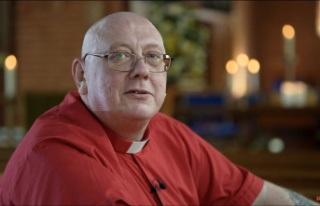First, you smell freshly cooked rice, lentils, and spinach in ladles, straight out of the steaming pots.
Dozens upon dozens of families, including those with babies, line up to receive a meal.
Chandrika Manel (mother of four) says, "We are here to eat."
She kneads rice with her hands and mixes it with the lentils, spinach, and before she feeds it to her child, she says that even buying bread can be difficult.
"I give them milk and rice at times, but they don't cook vegetables." They are too costly.
Inflation and depleted foreign reserves have ravaged Sri Lanka's economy over the past months. The crisis has been blamed on President Gotabaya Rajapaksa, who pushed for tax cuts that reduced the state's revenue and borrowed heavily from China to finance ambitious infrastructure projects. The situation has worsened due to the pandemic that hit tourism and the war in Ukraine which caused oil prices to rocket.
The BBC has been told by the United Nations Children's Fund that Sri Lanka is now in a humanitarian crisis.
According to the organisation, 70% of families in the country have reduced their food consumption since the beginning of the year. Furthermore, fuel and essential medicines are rapidly running out.
This is Ms Manel’s first time to a community cooking kitchen. She found that her options were disappearing and decided to take out loans to help her survive.
The kitchen is one month old. Pastor Moses Akash, a Colombo pastor, started it in a Colombo church hall after meeting a single mother who had lived on a jackfruit for three consecutive days.
Pastor Moses states, "We get people who don't have a second plate rice in the last four months."
According to his estimates, the number people waiting in line for food has increased from 50 to over 250 per day. This is not surprising considering that Sri Lankan food prices increased by 80% in June.
He says, "I see many children especially, most are malnourished."
Sahna, a 34-year-old pregnant woman who goes by her first initial only, is also waiting in the queue along with her three young children. She is due in September, and she is anxious about the future.
"My children are miserable. They are suffering in every way possible. I can't afford to buy milk or biscuits for my children.
Sahna's husband is a labourer and earns only $10 per week to support his family.
"Our leaders live better lives. Why can't mine? If their children live happily, then why shouldn't mine?" She asks.
Things are likely to worsen by the time Sahna has her child.
Recently, Colombo's mayor stated that there is not enough food in the capital until September.
Families are finding it difficult to cook or buy fuel, due to daily power outages and lack of fuel.
"Families are unable to purchase the same things they used to buy. They are not only cutting back on food, but also cutting back on healthy food. "So we are certainly getting into a position where malnutrition will be a major concern," stated Christian Skoog from Unicef Sri Lanka.
"We are trying to avoid a humanitarian emergency. While we are not yet at the point of children dying, it is a good thing. We need to get support urgently to prevent that."
Unicef appealed to the world for financial assistance to help thousands of children suffering from acute malnutrition and support one million people with primary healthcare.
According to Dr Renuka Jayatissa of the Sri Lanka Medical Nutrition Association, acute malnutrition rates could increase from 13% up to 20%. This would lead to a doubled number of severely malnourished children, currently at 35,000.
People often depend on strangers' kindnesses to help them through times of crisis. This has created a sense of solidarity. However, kindness and hope are precious commodities.
Dr Saman Kumara, a doctor at Colombo’s Castle Street hospital, says that his patients - tiny newborns -- would have been at risk if it weren't for the generosity of donors.
He stated that his hospital is now completely dependent on donations for essential medicines, equipment, and urged donors to get involved as the lives of patients are at risk.
Chandrika, back at the community kitchen is scooping up the last bit of food for her son.
"My best days have passed. She says, "But our children have so many things ahead of them."
"I don’t know what will happen when they grow up."












